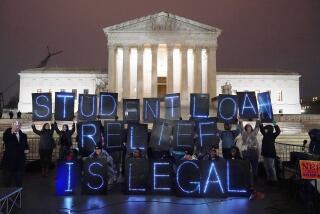An Activist in Control of Her Outrage
There she is at noon, across the street from the White House, speaking at a rally with congressmen and Kennedys, a Beastie Boy, Bianca Jagger and Richard Gere, protesting the visit by the president of China. Hers is the only voice that veers from the canned cadence; delivering an ode to her own people in China, she practically sings into the microphone.
Yet there she is seven hours later, inside the White House, on the receiving line at the state dinner, shaking hands with the president of China, whose comrades tortured her family during the Cultural Revolution and whose tanks plowed into Tiananmen Square over the bodies of her fellow Chinese.
When her turn in line comes, she is hugged by the president of the United States and greeted warmly by the president of China.
“Long time no see,” Jiang Zemin says to the lovely woman, dressed in a sleek gown of red Jacquard silk.
Bette Bao Lord smiles at Jiang, saying nothing--but not because she, the author of three novels and two nonfiction books, ever has been at a loss for words.
“To be perfectly frank,” Lord admits the morning after, “I was stunned: He spoke to me in English and I was expecting Chinese.”
*
By her participation in two such dramatically different events on Wednesday, Lord might seem to personify not only the ambivalence of many Americans toward China today, but also the Clinton administration’s controversial policy of “engaging” the Chinese diplomatically, rather than isolating them for abuses in human rights, arms proliferation and trade.
*
Lord is anything but ambivalent. The chairwoman of Freedom House, an important human rights group, she serves on the International Broadcasting Board of Governors, which oversees Voice of America and Radio Free Europe, and has lobbied to launch Radio Free Asia.
But she thinks “it’s important that people who agree on some subjects, and disagree on other subjects, find common ground. I think we make a mistake and [protesters] make a mistake if they paint horns on everyone who disagrees with them. It’s very important that we have a civil society.”
Lord, who is 59, was born in China but her aristocratic parents brought her and two older sisters to New York when she was 8, leaving a baby sister, Sansan, behind. Three years later, in 1949, the Communist revolution came, and the Baos could not go home.
The Bao family settled first in Brooklyn and later in Teaneck, N.J. After graduating from Tufts University and its Fletcher School of Law and Diplomacy, Bette married Winston Lord, who became a diplomat working closely on China for Henry Kissinger during the Nixon and Ford administrations.
The Lords eventually moved to China with their two children when Winston was appointed ambassador in Beijing by President Reagan. They stayed from November 1985 to mid-April 1989, just before Tiananmen.
Before moving to China, Lord wrote her first book, “Eighth Moon” (Harper and Row, 1962), the story of her sister Sansan’s life in modern China. Lord’s second and best-known book, “Spring Moon,” an epic novel of a Chinese family, was not published until 1981. It spent 31 weeks on the New York Times bestseller list.
“I like in my novels to talk about the commonality of people,” she says. “The wonderful thing is how so many people identify with Spring Moon (the novel’s central character). Here is a person so different, yet they can laugh with her and cry with her.”
*
When Lord became the ambassador’s wife, she gave up writing for full-time diplomacy, which for her meant hard-charging entertaining of everyone from Communist Party elite to artists and dissidents. Even her detractors--and there are several who reportedly felt she overstepped her role by getting involved in American policy in Beijing--admit she was a great voice for cultural unity between the two countries.
In the years since the Lords left Beijing, she has written more novels and a children’s book, has become increasingly active in human rights, and has spoken out as a China expert in the media. When the massacre erupted in Tiananmen, Lord, impeccably dressed and calm, spent hours as an on-air commentator for CBS.
“Bette is nothing less than cool and steely, full of life, vitality and intellectual interest,” says Les Gelb, president of the independent Council on Foreign Relations, who has known Lord since they were 17-year-old undergraduates at Tufts. “She is my kind of dragon lady.”
If Lord is practiced in civility, it is not just because she has learned it as a foreign service wife. Or from moving in the most elite of Washington’s social circles. Or, worse, because she is so cynical that she can be embraced--as she was at the state dinner--by Sen. Jesse Helms, a fellow strident critic of China but a man who almost sabotaged her husband’s appointment as ambassador by holding up his confirmation for six months.
Lord explains that she has learned, from her ancestors before her, to endure gracefully the conflicts of life. She tells this story:
During a trip to China in 1975, Lord and her aunt Goo Ma were greeted by a young man on a Beijing street. Her aunt had been a teacher but for six months was beaten by the Red Guard, when she was not being shut in a windowless broom closet in her school.
“See that guy?” the aunt said to Lord. “He beat me.” Lord started to run after him but her aunt stopped her, saying, “He was a casualty of history.”
More to Read
Sign up for Essential California
The most important California stories and recommendations in your inbox every morning.
You may occasionally receive promotional content from the Los Angeles Times.






